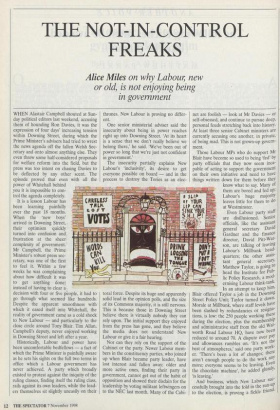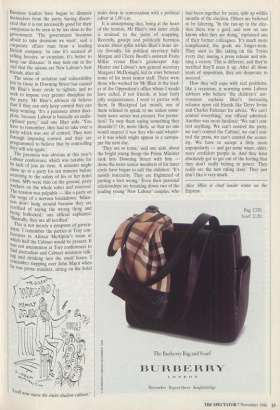THE NOT-IN-CONTROL FREAKS
Alice Miles on why Labour, new
or old, is not enjoying being in government
WHEN Alastair Campbell shouted at Sun- day political editors last weekend, accusing them of hounding Ron Davies, it was the expression of four days' increasing tension within Downing Street, during which the Prime Minister's advisers had tried to wrest the news agenda off the fallen Welsh Sec- retary and onto almost anything else. They even threw some half-considered proposals for welfare reform into the field, but the press was too intent on chasing Davies to be deflected by any other scent. The episode proved that even with all the power of Whitehall behind you it is impossible to con- trol the agenda completely.
Historically, Labour and power have been uncomfortable bedfellows — a fact of which the Prime Minister is painfully aware as he sets his sights on the full two terms in office which a Labour government has never achieved. A party which broadly existed to protest against the iniquity of the ruling classes, finding itself the ruling class, rails against its own leaders, while the lead- ers themselves sit slightly uneasily on their thrones. New Labour is proving no differ- ent.
One senior ministerial adviser said the insecurity about being in power reaches right up into Downing Street. 'At its heart is a sense that we don't really believe we belong there,' he said. 'We've been out of power so long that we're just not confident in government.'
The insecurity partially explains New Labour's 'inclusivity', its desire to get everyone possible on board — and in the process to destroy the Tories as an elec- toral force. Despite its huge and apparently solid lead in the opinion polls, and the size of its Commons majority, it is still nervous. This is because those in Downing Street believe there is virtually nobody they can rely upon. The initial support they enjoyed from the press has gone, and they believe the media does not understand New Labour or give it a fair hearing.
Nor can they rely on the support of the Cabinet or the party. Newer Labour mem- bers in the constituency parties, who joined up when Blair became party leader, have lost interest and fallen away; older and more active ones, finding their party in government, cannot get out of the habit of opposition and showed their disdain for the leadership by voting militant leftwingers on to the NEC last month. Many of the Cabi- net are foolish — look at Mr Davies — or self-obsessed, and continue to pursue deep, personal feuds stretching back into history. At least three senior Cabinet ministers are currently accusing one another, in private, of being mad. This is not grown-up govern- ment.
Those Labour MPs who do support Mr Blair have become so used to being led' by party officials that they now seem inca- pable of acting to support the government on their own initiative and need to have things written down for them before they know what to say. Many of them are bored and fed up; Labour's huge majoritY leaves little for them to do at Westminster.
Even Labour party staff are disillusioned. Senior officials, like the assistant general secretary David Gardner and the finance director, David Pitt-Wat- son, are talking of leaving Labour's Millbank head- quarters; the other assis- tant general secretary, Matthew Taylor, is going to head the Institute for pub- lic Policy Research, a mod- ernising Labour think-tank. In an attempt to keep biro, Blair offered Taylor a job in the Downing Street Policy Unit; Taylor turned it down. Morale at Millbank, where staff levels have been slashed by redundancies or resigna- tions, is low: the 250 people working there during the election, plus the membershiP and administrative staff from the old Wal- worth Road Labour HQ, have now been reduced to around 70. A dispute over paY and allowances rumbles on. 'It's not the best of atmospheres,' said one party work- er. 'There's been a lot of changes; there aren't enough people to do the work any more; everyone seems to be leaving. ENTn the chocolate machine', he added 0010 'is leaving.' And business, which New Labour sue- cessfully brought into the fold in the rup4113 to the election, is proving a fickle frleha' Business leaders have begun to distance themselves from the party, having discov- ered that it is not necessarily good for their companies to be seen to be too close to the government. 'The government becomes afraid to take decisions we want', said a corporate affairs man from a leading British company, 'in case it's accused of selling favours, or cronyism. It's better to keep our distance.' It may turn out in the end that the unions are New Labour's best friends, after all.
The sense of isolation and vulnerability felt by those in Downing Street has caused Mr Blair's inner circle to tighten, and to seek to impose ever greater discipline on the party. Mr Blair's advisers do believe that if they can only keep control they can keep winning. 'It's a paranoia about disci- pline, because Labour is basically an undis- ciplined party,' said one Blair aide. 'You have to remember, they had to take over a Party which was out of control. They won through imposing control, and they are Programmed to believe that by controlling they will win again.' The paranoia was obvious at this year's Labour conference, which was notable for its lack of joie de vivre. A minister might Show up at a party for ten minutes before scurrying to the safety of his or her hotel room. MPs were thin on the ground, party workers on the whole sober and reserved. The tension was palpable — like a party on the verge of a nervous breakdown. 'Minis- ters. don't hang around because they are terrified of saying the wrong thing and being bollocked,' one official explained. Basically, they are all terrified.' This is not merely a symptom of govern- ment. I remember the parties at Tory con- ferences in Alistair McAlpine's room at Which half the Cabinet would be present. It Was not uncommon at Tory conferences to t.ind journalists and Cabinet ministers talk- ing and drinking into the small hours. I remember stepping over John Major when h e Was prime minister, sitting on the hotel 7 will now name the entire shadow cabinet.' stairs deep in conversation with a political editor at 1.00 a.m.
It is unsurprising that, being at the heart of the tension, Mr Blair's own inner circle is strained to the point of snapping. Recently, gossipy and politically harmless stories about splits within Blair's inner cir- cle (broadly, his political secretary Sally Morgan and Cherie Booth's assistant Fiona Millar versus Blair's gatekeeper Anji Hunter and Labour's new general secretary Margaret McDonagh) led to rows between some of his most senior staff. There were those who worked for Mr Blair in the lead- er of the Opposition's office whom I would have called, if not friends, at least fairly jolly acquaintances. I went to parties with them. In Blackpool last month, one of them refused to speak to me unless some- body more senior was present. For protec- tion? To stop them saying something they shouldn't? Or, more likely, so that no one would suspect it was they who said whatev- er it was which might appear in a newspa- per the next day.
'They are so tense,' said one aide, about the bright young things the Prime Minister took into Downing Street with him — those the more senior members of his inner circle have begun to call 'the children'. 'It's mostly insecurity. They are frightened of putting a foot wrong.' Even their personal relationships are breaking down: two of the leading young 'New Labour' couples, who had been together for years, split up within months of the election. Others are believed to be faltering. 'In the run-up to the elec- tion there was a goal, and now no one knows what they are doing,' explained one of their former colleagues. 'It's much more complicated; the goals are longer-term. They used to like taking on the Tories every day; issuing a press release and win- ning a victory. This is different, and they're terrified they'll mess it up. After all those years of opposition, they are desperate to succeed.'
How they will cope with real problems, like a recession, is worrying some Labour advisers who believe 'the children's' ner- vousness explains Blair's increasing reliance upon old friends like Deny Irvine and Charles Falconer for advice. 'We can't control everything,' one official admitted. Another was more fatalistic: 'We can't con- trol anything. We can't control the party, we can't control the Cabinet, we can't con- trol the press, we can't control the econo- my. We have to accept a little more unpopularity — and get some wiser, older, more confident people in. And they have absolutely got to get out of the feeling that they don't really belong in power. They really are the new ruling class.' They just don't like it very much.
Alice Miles is chief leader writer on the Express.



















































































 Previous page
Previous page